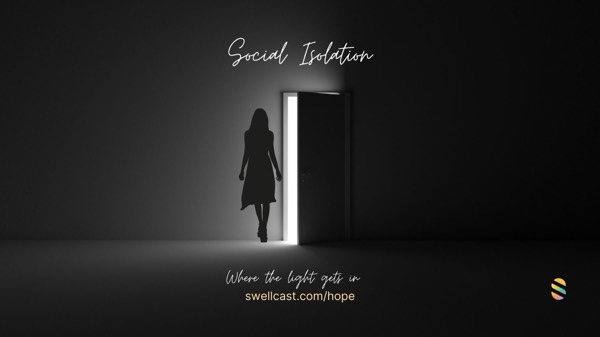
Mental Wellness Stories
@hope · 2:12
SOCIAL ISOLATION | Interview with Dr. Caron Post PhD
She is a licensed clinical psychologist and psychotherapist with over 25 years of experience, and she gets it. She sits with people all day long. She's an extraordinary person who really feels into people's lives with them. I think it's very brave to be a therapist and to be able to accompany people, especially people who are feeling so lost in that sense of connection. She deals a lot with loss and grief and trauma, and she also works with this concept of resilience

Mental Wellness Stories
@hope · 0:30
Hello to the first question. I want to really look at the factors that lead to social isolation. We can look at socioeconomic factors. We can look at demographics. Of course, we've touched on that this week. But what are some of those factors that we really need to look at besides demographic and age and situation? What are other factors that can lead somebody to socially isolate
Caron Post
@cpost17 · 5:00
Some of the negative effects that were spoken about of social isolation and loneliness can still be experienced, and they can be impacted, like with heart disease or addiction or all kinds of physical problems. So also, we touched on some of the people who are at most risk for loneliness. And it's young adults and low income adults, older adults, adults living alone, people with chronic diseases and disabilities, immigrants and individuals who identify as lesbian, gay, bisexual, transgender, or questioning

Mental Wellness Stories
@hope · 0:38
You. I know this might feel obvious, but I want the second question to look at loneliness, actually, because we're talking about why people become socially isolated, but then from that they become lonely. Can you, from a therapeutic point of view, can you talk about what loneliness actually is? And what are the types of loneliness, us experiences that you've studied and come across?
Caron Post
@cpost17 · 3:00
And there's transient loneliness that kind of comes and goes, situational loneliness, which has to do with certain times of the year or Sundays, holidays, where loneliness can come to us, feelings of loneliness. And then there's chronic loneliness, which is feeling lonely all or most of the time. And also, I'm sure everybody has experienced loneliness, but also differences in the intensity of loneliness. So sometimes it could be a mild or moderate feeling, and sometimes it can be excruciatingly intense
Swell Team
@Swell · 0:15

Mental Wellness Stories
@hope · 0:46
You for the third question. I wanted to talk about ways of relieving the loneliness that you're talking about from the inside and also from the outside. Meaning connecting ourselves to things externally that can help us, but also examining ourselves from the inside and knowing how we can just feel better. I'm sure you see so much in your practice where you see people at point a and then they get to point b and c and f and g, and that must be wonderful
Caron Post
@cpost17 · 5:00
So it might be also kind of give a false sense of connectedness, and therefore cause people to limit their social interactions and avoid real and meaningful conversations. So it's important to remember that, too, about each other. When you see things posted on social media and a person's looking like they're connected and having a great time, that doesn't mean that they're not feeling lonely

Deborah Pardes
@DBPardes · 1:18
And then by the 10th time you're like totally feeling like you're connected to a community. I think that's a really important aspect to this because it's scary to break out of isolation. If you've been in it for a while. It's just really great to hear your thoughts that you're so gentle and knowledgeable. I look forward to hearing more voices around this topic because I think it's so important. Thank you
